CO 24 Denial Code: Reason Code, Explanation, and Resolution
In this blog, we break down what it means, why it's important, how to prevent it, and what to do after encountering the CO 24 denial.

Did you know that nearly 1 in 5 medical claims get denied on the first submission? For billing teams, that's not just a delay; it's a distribution that can lead to lost revenue, increased administrative burden, and frustration for providers and patients.
Denied claims can happen for a wide range of reasons, often tied to insurance plan details, but understanding the specific codes attached to them is the first step in fixing the problem.
One common denial code that is often a cause of confusion is the denial code CO 24.
In this blog, we break down what it means, why it's important, how to prevent it, and what to do after encountering the CO 24 denial.
Let's jump in!
The Basics of Denial Codes and CO 24
Before we talk about what this specific denial code is, it’s important to understand what a denial code is and why it matters in the healthcare revenue cycle. A denial code is a message sent by an insurance provider to explain why a claim has not been paid. These codes are essential for healthcare billing teams because they identify the exact issue preventing payment. Understanding these codes helps providers and billing staff correct errors, appeal denials when appropriate, and improve claim accuracy.
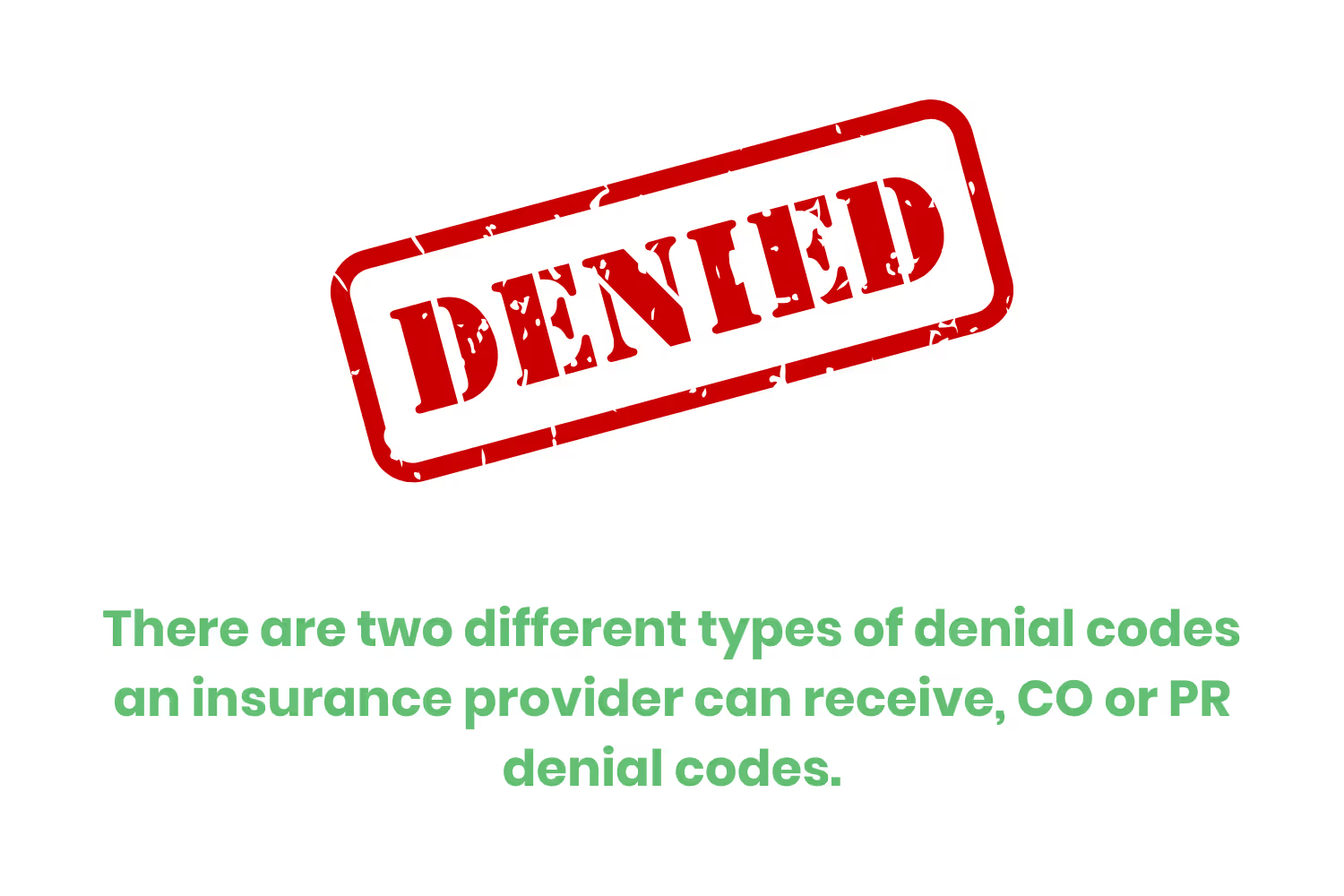
There are two different types of denial codes an insurance provider can receive, CO or PR denial codes. A CO denial code means that there is a contractual obligation between the patient and the insurance company. Meaning the patient is not responsible for the denied amount. A PR denial code means that it is the patient’s responsibility to pay for either partially or the full bill.
One denial code that often confuses is CO 24, which involves a type of reimbursement model known as capitation. To fully understand CO 24, it is important to understand how capitation and managed care plans work.
Understanding the Reason Code for a CO 24 Denial
Now, what does CO 24 specifically mean? In short, it means the charges get covered under a capitation agreement or a managed care plan.
A capitation agreement is when the provider gets a set monthly payment per patient, no matter how many services the patient receives. This prepaid arrangement covers a broad range of services.
Since the provider has already gotten paid through capitation, they can not bill separately for services included in the contract. If they do, the claim will be denied with a CO 24 code in return.
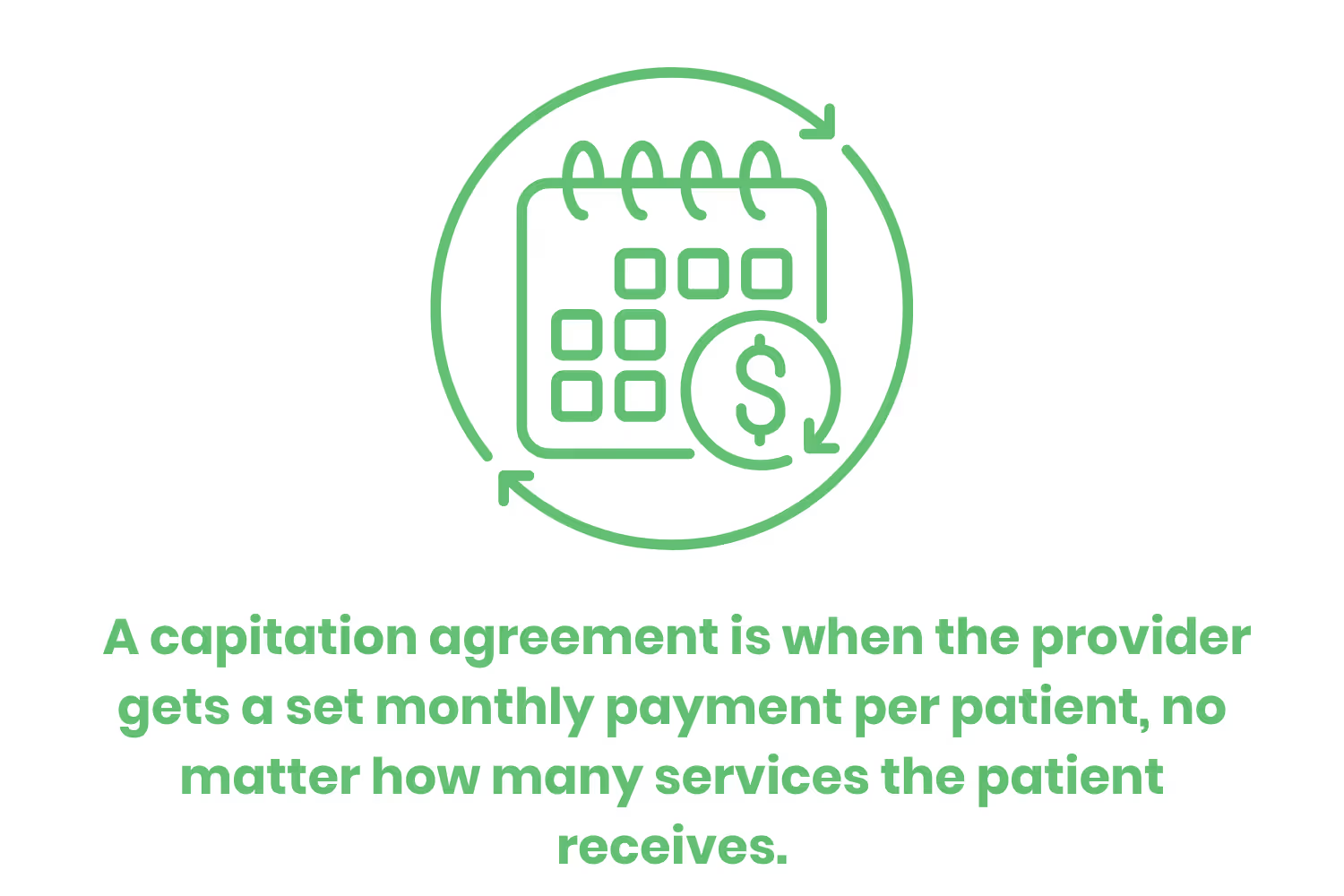
What are The Common Explanations for CO 24 Denial?
There isn't just one reason a claim gets denied with CO 24; this code can stem from several common billing and eligibility issues. Here are some of the most frequent explanations:
Patient is in a Capitated Plan-
If the patient is enrolled in a capitated plan, the provider receives a fixed monthly payment to cover a wide range of services. If the provider submits a separate claim for services already included in the capitation agreement, it will be denied. That’s because the insurer considers those services already prepaid for.
Incorrect Payer Billed
This code will often happen when a claim gets submitted to the wrong payer, typically traditional Medicare or Medicaid. When the patient is enrolled in managed care or a capitated plan. If staff members don't verify this before, the claim will go to the wrong payer and get denied, since the payer isn't responsible for the charges.
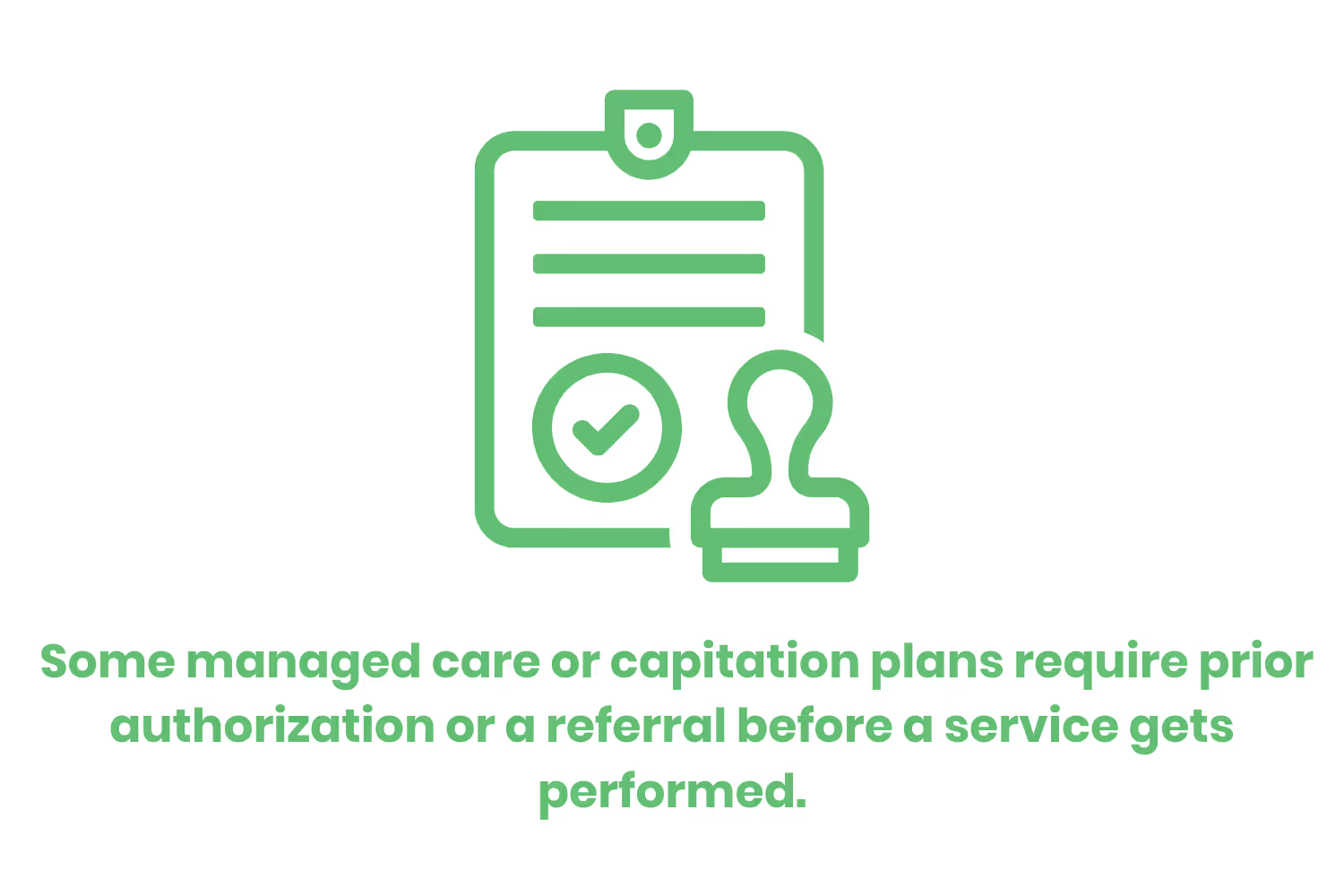
Authorization or Referral Missing
There are some managed care or capitation plans that require prior authorization or a referral before a service is performed. If the service gets completed without following the requirements, the claim will get denied, not because the service was medically unnecessary, but because it wasn't pre-approved.
Out-of-Network Provider
Many managed care plans only cover services provided by in-network providers. If a provider is not contracted with the plan, the claim may get denied under co24, even if it was medically necessary. This is a good example of why it is important to confirm network status before delivering care or submitting a claim.
How to Prevent CO 24 Denial Issues?
Having a basic understanding of what this denial code means is the first step. Knowing how to prevent this denial can help save time, money and lessen the overall burden on your team.
Step 1: Confirm Eligibility and Capitation Status
When a patient comes in for a visit, staff should confirm whether their coverage falls under a capitation agreement. Confirming this upfront helps reduce the chances of denials caused by eligibility errors.
Step 2: Check the Payer Hierarchy
When your staff is submitting a claim, it is important to ensure it is being submitted to the correct payer. Check with the Coordination of Benefits (COB) information to help ensure claims get routed properly and reduce the chance of a denial.
Step 3: Review Capitation Contract Terms
Your organization must understand which services get covered under the capitation payment and which are not, and therefore billed separately. Capitation contracts vary between providers and payers, so keeping copies of the specific contracts can be very helpful.
Step 4: Train Staff on Billing Workflows
Denials can stem from front-end errors (eligibility, incorrect payer, misunderstanding of capitated services) staff training is one of the most effective ways to prevent them. When your billing, front desk, and clinical teams understand capitation basics, payer rules, and why not to bill separately, reduce the risk of denials. Consider regular refreshers and onboarding training as payer rules change or new contracts come in.
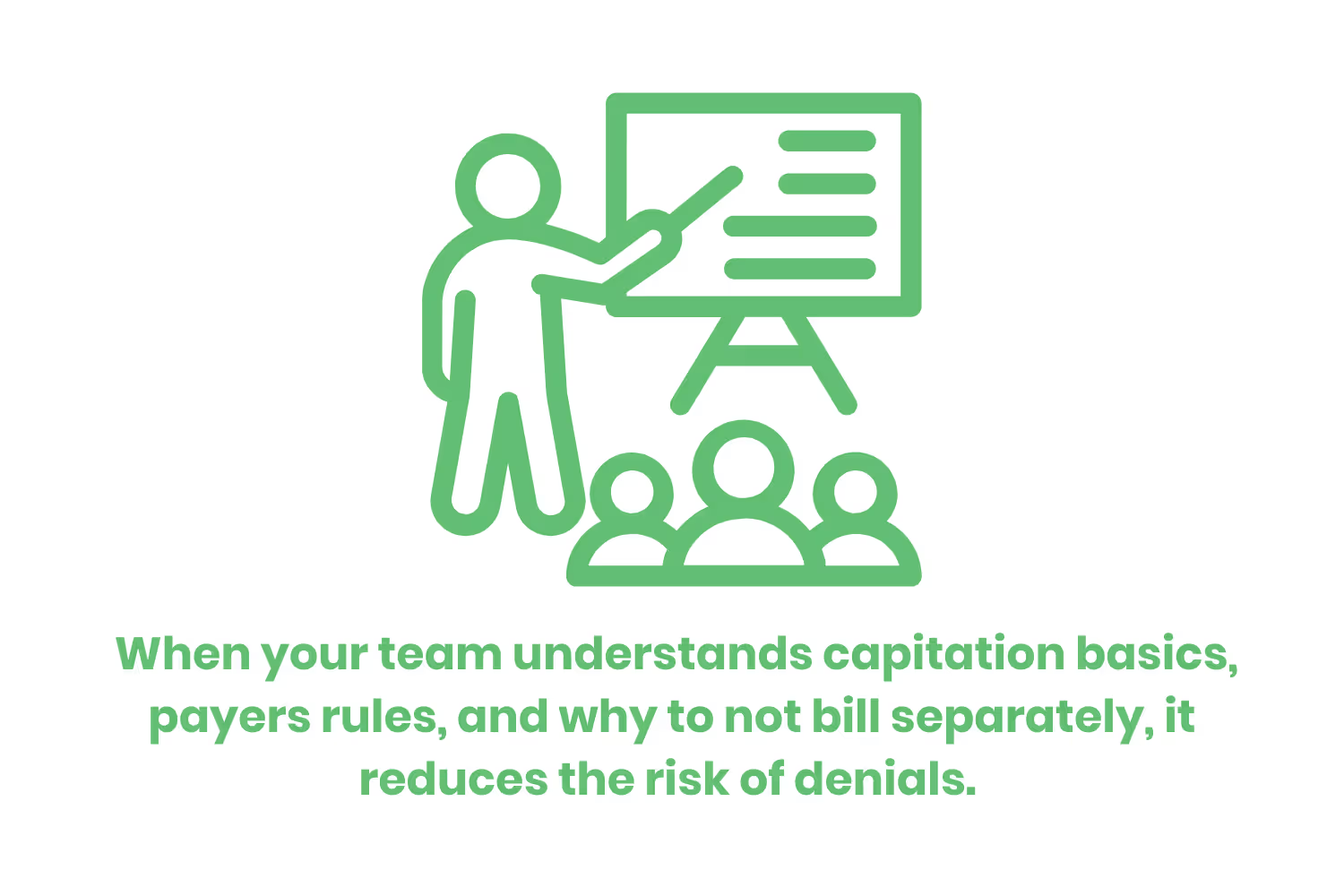
How to Resolve CO 24 Denials
After receiving a CO 24 denial, the next step is to investigate why it occurred and what can be done to address it. Fortunately, there are a few tools available to help resolve CO 24 denials quickly and accurately.
Review the Denial Explanation
When the team first receives the denial, it is important to review the details carefully. Understanding the reason behind the denial helps identify the correct next steps.
Gather Supporting Documentation
Collect all relevant documentation, such as capitation contracts, patient eligibility verification at the time of service, and any prior authorizations or referrals.
Resubmit or Appeal (If Appropriate)
If your staff does receive a denial code and determines that it did get submitted correctly, the next step is to file an appeal. This appeal should include supporting documentation that proves the service was billable and not part of the capitation agreement. Accurate claim submission from the start can reduce delays and improve your chances of reimbursement.
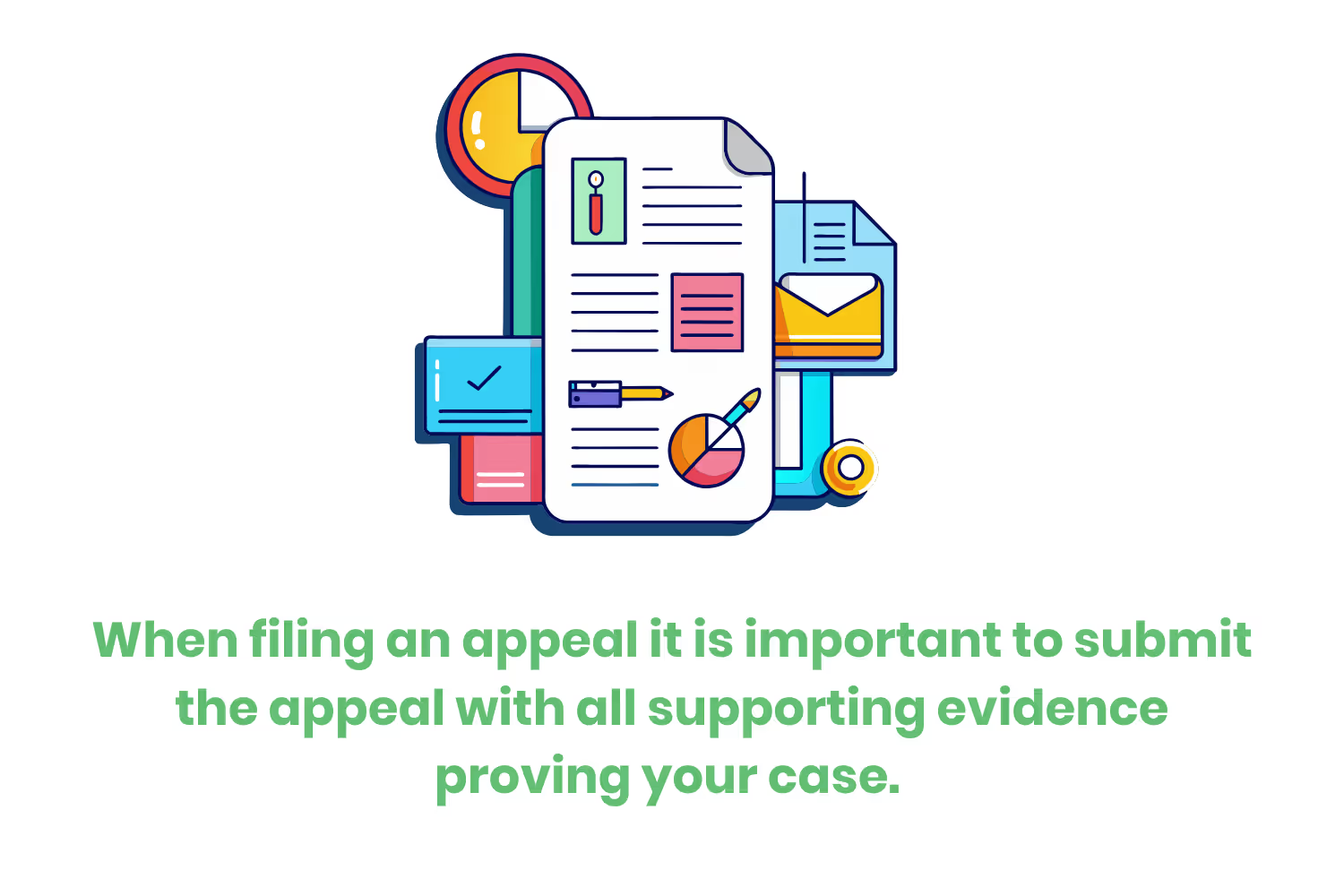
Conclusion
CO 24 denials can be confusing, but understanding their meaning and the capitation payment model behind them is essential for healthcare providers and billing teams. By proactively verifying eligibility, understanding contract denials, improving cash flow, and streamlining the revenue cycle. The key to avoiding future issues is learning what led to the denial and correcting the process accordingly.
Emphasize your product's unique features or benefits to differentiate it from competitors
In nec dictum adipiscing pharetra enim etiam scelerisque dolor purus ipsum egestas cursus vulputate arcu egestas ut eu sed mollis consectetur mattis pharetra curabitur et maecenas in mattis fames consectetur ipsum quis risus mauris aliquam ornare nisl purus at ipsum nulla accumsan consectetur vestibulum suspendisse aliquam condimentum scelerisque lacinia pellentesque vestibulum condimentum turpis ligula pharetra dictum sapien facilisis sapien at sagittis et cursus congue.
- Pharetra curabitur et maecenas in mattis fames consectetur ipsum quis risus.
- Justo urna nisi auctor consequat consectetur dolor lectus blandit.
- Eget egestas volutpat lacinia vestibulum vitae mattis hendrerit.
- Ornare elit odio tellus orci bibendum dictum id sem congue enim amet diam.
Incorporate statistics or specific numbers to highlight the effectiveness or popularity of your offering
Convallis pellentesque ullamcorper sapien sed tristique fermentum proin amet quam tincidunt feugiat vitae neque quisque odio ut pellentesque ac mauris eget lectus. Pretium arcu turpis lacus sapien sit at eu sapien duis magna nunc nibh nam non ut nibh ultrices ultrices elementum egestas enim nisl sed cursus pellentesque sit dignissim enim euismod sit et convallis sed pelis viverra quam at nisl sit pharetra enim nisl nec vestibulum posuere in volutpat sed blandit neque risus.

Use time-sensitive language to encourage immediate action, such as "Limited Time Offer
Feugiat vitae neque quisque odio ut pellentesque ac mauris eget lectus. Pretium arcu turpis lacus sapien sit at eu sapien duis magna nunc nibh nam non ut nibh ultrices ultrices elementum egestas enim nisl sed cursus pellentesque sit dignissim enim euismod sit et convallis sed pelis viverra quam at nisl sit pharetra enim nisl nec vestibulum posuere in volutpat sed blandit neque risus.
- Pharetra curabitur et maecenas in mattis fames consectetur ipsum quis risus.
- Justo urna nisi auctor consequat consectetur dolor lectus blandit.
- Eget egestas volutpat lacinia vestibulum vitae mattis hendrerit.
- Ornare elit odio tellus orci bibendum dictum id sem congue enim amet diam.
Address customer pain points directly by showing how your product solves their problems
Feugiat vitae neque quisque odio ut pellentesque ac mauris eget lectus. Pretium arcu turpis lacus sapien sit at eu sapien duis magna nunc nibh nam non ut nibh ultrices ultrices elementum egestas enim nisl sed cursus pellentesque sit dignissim enim euismod sit et convallis sed pelis viverra quam at nisl sit pharetra enim nisl nec vestibulum posuere in volutpat sed blandit neque risus.
Vel etiam vel amet aenean eget in habitasse nunc duis tellus sem turpis risus aliquam ac volutpat tellus eu faucibus ullamcorper.
Tailor titles to your ideal customer segment using phrases like "Designed for Busy Professionals
Sed pretium id nibh id sit felis vitae volutpat volutpat adipiscing at sodales neque lectus mi phasellus commodo at elit suspendisse ornare faucibus lectus purus viverra in nec aliquet commodo et sed sed nisi tempor mi pellentesque arcu viverra pretium duis enim vulputate dignissim etiam ultrices vitae neque urna proin nibh diam turpis augue lacus.




